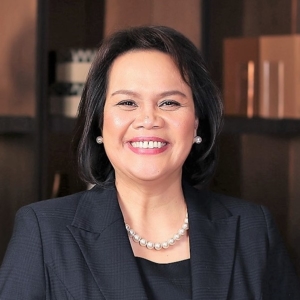

My Career
Journey
My Career Journey with Maria Victoria Tan
Maria Victoria Tan
Head, Group Risk Management and Sustainability Unit
Ayala Corporation

I made a risky decision in 2013.
Usually, an individual tries a new career path within the same employer but in my case, I changed career and I changed employer. Others take the path of minimum risk, but it was not so for me.
A quick look into Ayala Corporation
With 187 years of history, Ayala Corporation is the oldest and one of the largest conglomerates in the Philippines with core interests in real estate, banking, telecommunications, and power. It also has portfolio investments in various industries including water, industrial technologies, infrastructure, health, and education. Additionally, Ayala has a social commitment arm, Ayala Foundation, which is focused on bettering the lives of Filipinos primarily by strengthening education, youth leadership, sustainability livelihood, and arts and culture in the country.
Ayala continues to grow its regional and global footprint, serving millions of customers across all market segments. It continues to create shared value to its diverse stakeholders, staying true to its promise of reinventing businesses, transforming Communities which is at the heart of its purpose of improving lives.
My decision points:
- I wanted to be in a forefront type of work after being at the back end for so long, while still being related to my previous work – risk management offers that opportunity.
- I also thought, after being in a fast-paced industry sector, how about joining another that is not as fast-paced? Ayala Corporation is a parent company, there is not much daily customer inter-facing activities.
- How about the company’s culture, the soft intangibles? The rounds of interviews I had with Ayala Corporation’s senior management team and my own checking with my inner circle showed that the company takes care of its people well and provides a good working environment.
So, I signed up. It was a decision with high risk and high reward. So far, the journey is exciting, rewarding but not without challenges.
I ran before I walked, I kept my head above the waters and learned new skills. I started building my networks locally and regionally. I read every article I can find about risk management. I joined organizations/associations and exchanged notes with members.
I set a vision (that I did not know how to achieve back then), made a roadmap of baby steps, and engaged experts.
I hired my team that is still growing as of this writing. My team created momentum and sustained it until the end of our 2020 Roadmap and we are set to establish our new pathway considering the changing environment and issues from stakeholders.
I realized three things that greatly helped me in this journey:
- Education
- Build credibility by educating oneself and practicing what you learn repeatedly, so competency is developed and enhanced.
- Create awareness about risk management, risk transfer strategy, and sustainability at all levels of the organization. The Senior team needs to be informed of the risk profile of the organization, the emerging risks, and possible risk management strategies they can employ. In support of this, the remaining levels must understand their role in risk management and the role they play in the grander scheme of things. This drives risk management to be seen not as an additional job but an integral part of everyone’s everyday operations.
- Engagement
- Equip all internal stakeholders in the risk management process so they can manage risks confidently and efficiently.
- Engage other stakeholders whose opinion matters so that issues are discussed, evaluated, assessed, and prioritized.
- Engage experts that will provide guidance, external point-of-views, and benchmarking standards for the institution.
- Execution
- A pre-execution exercise is necessary to check what could go wrong during execution. It is also a way to check your stakeholders’ experience.
- Execute strategies, projects, and activities timely and efficiently. Solicit feedback for future improvement.
- Report on progress and results of plans. An evaluation report is always welcome.
Most of all, watch out for the non-verbal cues of your stakeholders, and fearlessly ask challenging and thought-provoking questions.
Listen carefully, for their insights will be the most important results of any activity.
With all challenges in the field of risk management today, everything seems impossible until it is done. The best part is what you learn along the way.